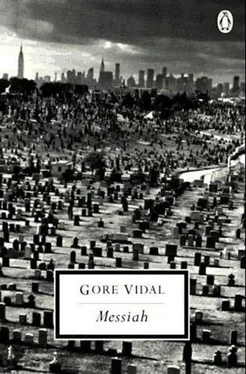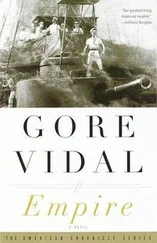Gore Vidal - Messiah
Здесь есть возможность читать онлайн «Gore Vidal - Messiah» весь текст электронной книги совершенно бесплатно (целиком полную версию без сокращений). В некоторых случаях можно слушать аудио, скачать через торрент в формате fb2 и присутствует краткое содержание. Жанр: Современная проза, на английском языке. Описание произведения, (предисловие) а так же отзывы посетителей доступны на портале библиотеки ЛибКат.
- Название:Messiah
- Автор:
- Жанр:
- Год:неизвестен
- ISBN:нет данных
- Рейтинг книги:3 / 5. Голосов: 1
-
Избранное:Добавить в избранное
- Отзывы:
-
Ваша оценка:
- 60
- 1
- 2
- 3
- 4
- 5
Messiah: краткое содержание, описание и аннотация
Предлагаем к чтению аннотацию, описание, краткое содержание или предисловие (зависит от того, что написал сам автор книги «Messiah»). Если вы не нашли необходимую информацию о книге — напишите в комментариях, мы постараемся отыскать её.
Messiah — читать онлайн бесплатно полную книгу (весь текст) целиком
Ниже представлен текст книги, разбитый по страницам. Система сохранения места последней прочитанной страницы, позволяет с удобством читать онлайн бесплатно книгу «Messiah», без необходимости каждый раз заново искать на чём Вы остановились. Поставьте закладку, и сможете в любой момент перейти на страницу, на которой закончили чтение.
Интервал:
Закладка:
"I think they're just good friends, like we say in these parts. Except that I doubt if anything is going on… they don't seem the type and she's so completely gone on what he has to say…"
A long-legged girl secretary in discreet black entered the room unbidden and whispered something to the publicist. Paul started as though she had given him an electric shock from the thick carpeting. He spoke quickly: "Get Furlow. Tell him to stand bail. Also get a writ. I'll be right down there."
She ran from the room. He pushed the bar away from him and it rolled aimlessly across the floor, its bottles and glasses chattering. Paul looked at me distractedly. "He's in jail. Cave's in jail."
Five
1
Last night the noise of my heart's beating kept me awake until nearly dawn. Then, as the gray warm light of the morning patterned the floor, I fell asleep and dreamed uneasily of disaster, my dreams disturbed by the noise of jackals, by that jackal-headed god who hovers over me as these last days unfold confusedly before my eyes: it will end in heat and terror, alone beside a muddy river, all time as one and that soon gone. I awakened, breathless and cold, with a terror of the dying still ahead.
After coffee and pills, those assorted pellets which seem to restore me for moments at a time to a false serenity, I put aside the nightmare world of the previous restless hours and idly examined the pages which I had written with an eye to rereading them straight through, to relive again for a time the old drama which is already, as I write, separating itself from my memory and becoming real only in the prose: I think now of these events as I have told them and not as they occur to me in memory. For the memory now is of pages and not of scenes or of actual human beings still existing in that baleful, tenebrous region of the imagination where fancy and fact together confuse even the most confident of narrators. I have, thus far at least, exorcised demons, and to have lost certain memories to my narrative relieves my system, like a cancer cut whole from a failing organism.
The boy brought me my morning coffee and the local newspaper whose Arabic text pleases my eye though the sense, when I do translate it, is less than strange. I asked the boy if Mr Butler was awake and he said he had gone out already: these last few days I have kept to my room even for the evening meal, delaying the inevitable revelation as long as possible.
After the boy left and while I drank coffee and looked out upon the river and the western hills, I was conscious of a sense of well-being which I have not often experienced in recent years. Perhaps the work of evoking the past has, in a sense, enhanced the present for me. I thought of the work done as life preserved, as part of me which will remain. Then, idly, I riffled the pages of John Cave's Testament for the first time since I had discovered my name had been expunged.
The opening was the familiar one which I had composed so many years before in Cave's name. The time of divination: a straightforward account of the apparent wonders which had preceded the mission. No credence was given the supernatural but a good case was made (borrowed a little from the mental therapists) for the race's need of phenomena as a symptom of unease and boredom and anticipation. I flicked through the pages. An entire new part had been added which I did not recognize: still written as though by Cave but, obviously, it could not have been composed until at least a decade after his death.
I read the new section carefully. Whoever had written it had been strongly under the influence of the pragmatic philosophers, though the style was somewhat inspirational: a combination of a guide to popularity crossed with the Koran. A whole system of ideal behavior was sketched broadly for the devout, so broadly as to be fairly useless though the commentary and the interpretive analysis of such lines as: "Property really belongs to the world though individuals may have temporary liens on certain sections," must be already prodigious. I was well into the metaphysics of the Cavites when there was a knock on my door. It was Butler, looking red and uncomfortable from the heat, a spotted red bandana tied, for some inscrutable reason, about his head in place of a hat. "Hope you don't mind my barging in like this but I finished a visit with the mayor earlier than I thought." He crumpled, on invitation, into a chair opposite me. He sighed gloomily. "This is going to be tough, tougher than I ever imagined back home."
"I told you it would be. The Moslems are very obstinate."
"I'll say! and the old devil of a mayor practically told me point-blank that if he caught me proselyting he'd send me back to Cairo. Imagine the nerve!"
"Well, it is their country," I said, reasonably, experiencing my first real hope: might the Cavites not get themselves expelled from Islam: I knew the mayor of Luxor, a genial merchant who still enjoyed the obsolete title of Pasha. The possibilities of a daring plot occurred to me. All I needed was another year or two by which time nature would have done its work in any case and the conquest of humanity by the Cavites could then continue its progress without my bitter presence.
I looked at Butler speculatively. He was such a fool. I could, I was sure, undo him, for a time at least; unless of course he was, as I first expected, an agent come to finish me in fact as absolutely as I have been finished in effect by those revisionists who have taken my place among the Cavites, arranging history… I'd experienced, briefly, while studying Butler's copy of the Testament, the unnerving sense of having never lived, of having dreamed the past entire.
"Maybe it is their country but we got the truth, and like Paul Himmell said: 'A truth known to only half the world is but half a truth.'"
"Did he say that?"
"Of course he did. Don't you…" he paused. His eye taking in at last the book in my hand. His expression softened somewhat, like a parent in anger noticing suddenly an endearing resemblance to himself in the offending child. "But I forget how isolated you've been up here. If I've interrupted your studies, I'll go away."
"Oh no. I was finished when you came. I've been studying for several hours which is too long for an old man."
"If a contemplation of Cavesword can ever be too long," said Butler reverently. "Yes, Himmell wrote that even before Cavesword, in the month of March, I believe, though we'll have to ask my colleague when he comes. He knows all the dates, all the facts. Remarkable guy. He has the brains of the team." And Butler laughed to show that he was not entirely serious.
"I think they might respond to pressure," I said, treacherously. "One thing the Arabs respect is force."
"You may be right. But our instructions are to go slow. Still, I didn't think it would be as slow as this. Why we haven't been able to get a building yet. They've all been told by the Pasha fellow not to rent to us."
"Perhaps I could talk to him."
"Do you know him well?"
"We used to play cards quite regularly. I haven't seen much of him in the past few years but, if you'd like, I'll go and pay him a call."
"He's known all along you're a Cavite, hasn't he?"
"We have kept off the subject of religion entirely. As you probably discovered, since the division of the world, there's been little communication between East and West. I don't think he knows much about the Cavites except that they're undesirable."
"Poor creature," said Butler, compassionately.
"Outer darkness," I agreed.
"But mark my words before ten years have passed they will have the truth."
"I have no doubt of that, Communicator, none at all. If the others who come out have even a tenth of your devotion the work will go fast." The easy words of praise came back to me mechanically from those decades when a large part of my work was organizational, spurring the mediocre on to great deeds… and the truth of the matter has been, traditionally, that the unimaginative are the stuff from which heroes and martyrs are invariably made.
Читать дальшеИнтервал:
Закладка:
Похожие книги на «Messiah»
Представляем Вашему вниманию похожие книги на «Messiah» списком для выбора. Мы отобрали схожую по названию и смыслу литературу в надежде предоставить читателям больше вариантов отыскать новые, интересные, ещё непрочитанные произведения.
Обсуждение, отзывы о книге «Messiah» и просто собственные мнения читателей. Оставьте ваши комментарии, напишите, что Вы думаете о произведении, его смысле или главных героях. Укажите что конкретно понравилось, а что нет, и почему Вы так считаете.












